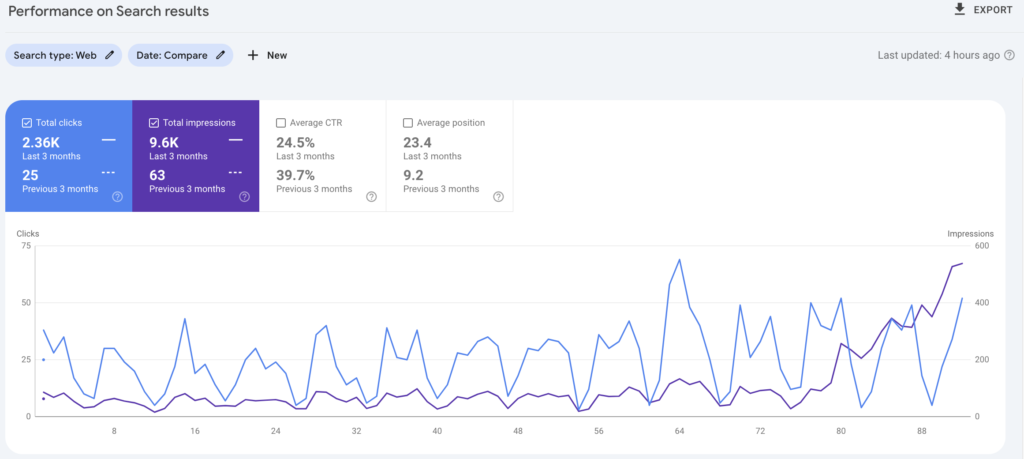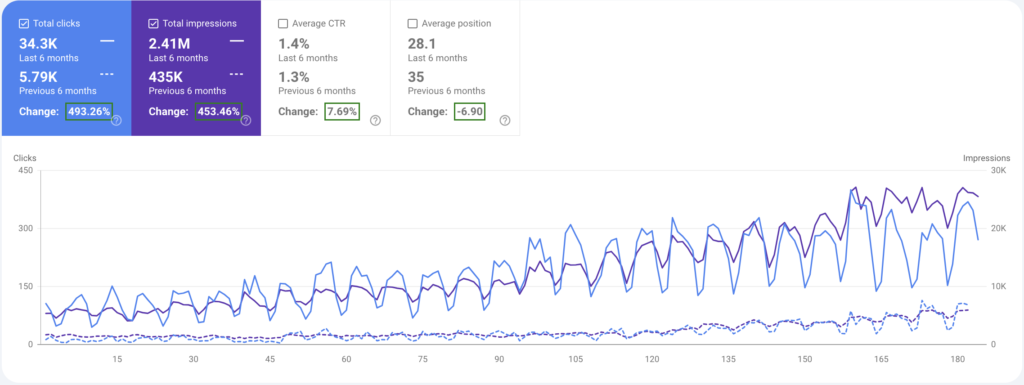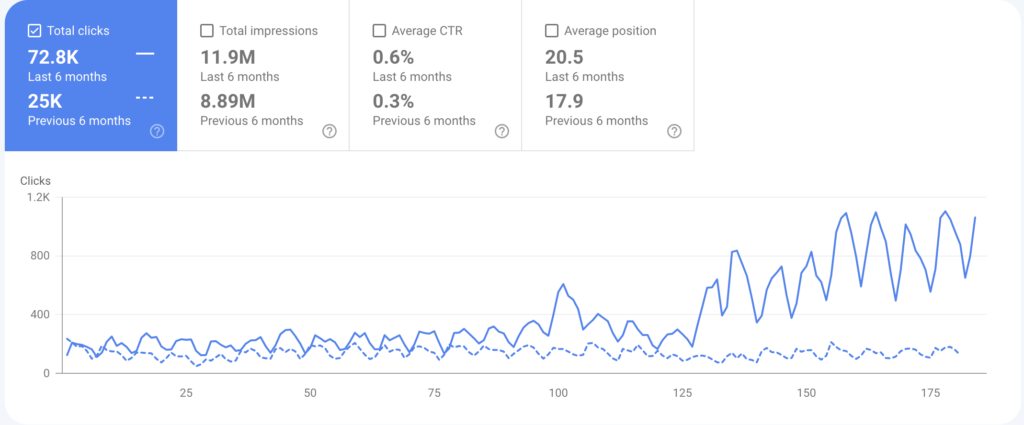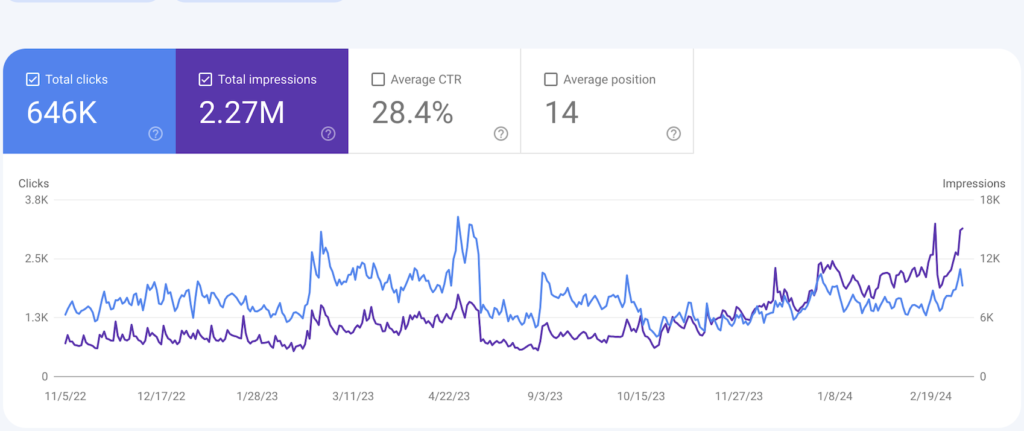A high blogging DA (Domain Authority) isn’t just a number. It affects how well your site ranks on search engines, how much organic traffic you get, and how credible your brand appears online. A stronger DA can give you a serious edge if you run a business, blog, or marketing campaign.
But, increasing DA takes time and effort. It’s not about quick tricks or shortcuts. You need a solid strategy with high-quality backlinks, clever SEO tricks, valuable content, and ongoing performance checks.
This guide will walk you through everything you need to know: what DA is, why it matters, and the exact steps to improve it.
Furthermore, if you need better backlinks? Stronger content? Or a website that the Google search engine ranks easily? We’ve got you covered. At Thrivecraft, we help businesses grow their online presence with accurate, effective SEO strategies.
We have experts who create engaging, technical content using better SEO strategies to increase your backlinking profile. We develop content with authoritative backlinks from high-DA websites and ensure your website ranks higher in Google search results with better Domain Authority scores.
Want to build the highest DA score? Book a free consultation with Thrivecraft today, and let’s create an SEO strategy that works for you.
What Is DA (Domain Authority)?
DA (Domain Authority) was developed by Moz to know search engine ranking scores that predict a website’s ranking on SERP (search engine results page). It is scored on a scale of 1 to 100. A higher score indicates a better ability to rank.
The factors calculated for DA include the number of quality backlinks, the domain age, and a website’s overall authority. DA is a complex and remarkable way for a website owner, marketer, and SEO professional to evaluate a site’s credibility.
Importance of the Domain Authority
- Competitive Benchmarking: DA enables businesses to compare their website’s power with their competitors.
- Link-building Strategy: High DA websites are perceived as brand authorities and can work well for backlink opportunities.
- SEO Performance Indicator: Although DA is not a direct Google ranking factor, it correlates to SERP rankings.
How Domain Authority Affects SEO
- Higher DA, Better Ranking: A website with a high DA tends to rank higher on Google for competitive keywords.
- Link-building Opportunities: Due to a high DA score, a site may be more attractive for partnerships & guest posting.
- Trust and Credibility: Search engines and users trust high-DA websites, which provide a steady source of organic traffic and engagement.
- Influences Page Authority (PA): While DA helps measure the strength of the entire domain, higher rankings benefit individual pages with substantial PAs.
- To improve Domain Authority, focus on getting high-quality backlinks. It is also crucial to publish authoritative content aligned with best SEO practices.
How Domain Authority Is Calculated
Domain Authority (DA) is calculated on multiple factors and the strength of a website’s backlink profile.
Role of Backlinks and Link Quality
Backlinks are essential in determining a website’s DA. However, not all links are equal. Moz’s algorithm prioritizes quality over quantity while calculating a domain’s authority. Types of backlinks:
- High-Quality Backlinks: Links from reputable, high-DA websites pass more authority.
- Dofollow vs. Nofollow Links: Dofollow links contribute to DA, whereas nofollow links do not pass link equity.
- Diversity of Referring Domains: A diverse backlink from multiple domains is more valuable than many links from a single source.
- Toxic Backlinks: Spammy or low-quality links negatively impact a website, so regular backlink audits are essential.
Website Age and Trustworthiness
Older websites have a higher DA because they accumulate backlinks over time, which helps them establish trust and credibility in their niche. Search engines recognize them as authoritative sources if they maintain consistent quality.
However, newer websites can quickly improve their DA by implementing strong SEO strategies and publishing high-quality content.
Content Quality and Relevance
Search engines prefer websites that provide essential, unique, and engaging content. High-quality content contributes to DA in various ways:
- Informative content that provides a proper guide can acquire backlinks naturally.
- It attracts user engagement with longer session duration by reducing bouncing-off rates.
- Optimized content gets more keyword rankings on SERP leading to more organic traffic and backlinks.
On-Page and Technical SEO Factors
You should ensure proper content and technical SEO for a better website’s Domain Authority.
On-Page SEO Factors
On-page and technical SEO factors are essential for the modification of DA:
- On-page SEO factors refer to the ease of optimizing the correct keyword. By using the right keywords in the content without stuffing them into it.
- Internal linking refers to the suitable methods to help the need for page authority over the site.
- Mobile optimization facilitates working on various mobile devices across multiple platforms.
Technical SEO Factors
Work on a website’s speed. A faster site improves user experience and reduces bounce rates. A secure SSL HTTPS connection indicates that the site is more trustworthy. The better the sitemap and robots.txt files, the better the chance for the search engines to be able to index the site properly.
SEO service providers must focus entirely on quality backlinks, technical SEO, and great content to build a high Domain Authority (DA) score. A high DA score generally means more visibility and credibility in search engines.
Why Domain Authority Matters for SEO
Google does not use DA as a direct ranking factor. Websites with higher DA often perform better in search results due to stronger backlink profiles, credibility, and SEO optimization.
Impact on Google Rankings
- Stronger Backlink Profile: A high DA profile indicates a well-established backlink network, a key ranking factor in Google’s algorithm.
- Better Competitive Positioning: Comparing DA with competitors helps businesses assess their ranking strength in SERPs.
- Increased Crawl Priority: Websites with high DA have more chances to be crawled and indexed by search engines, which improves visibility.
Relationship Between DA and Page Authority (PA)
- Domain Authority (DA) provides the website’s overall ranking strength metrics.
- Page Authority (PA) measures the ranking potential of an individual webpage.
A high DA often leads to higher PA across multiple pages, helping individual blog posts, product pages, and landing pages rank better. However, a page with a strong PA can still rank well even if the overall domain DA is lower.
How DA Influences Organic Traffic
- Higher SERP Rankings: Websites with strong DA scores get high rankings easily on search results pages.
- Increased Referral Traffic: High DA websites often receive backlinks from authoritative sources. It helps to divert referrals.
- Enhanced Trust & Credibility: Users prefer to click on links from high-authority websites. It leads to better engagement and conversion rates.
How to Improve Domain Authority
You should focus on some comprehensive SEO strategies including high-quality backlinks, technical SEO, and valuable content to improve Domain Authority (DA).
Build High-Quality Backlinks
- Earn Backlinks from Authoritative Sites: Obtain quality backlinks from high Domain Authority websites by creating engaging and valuable content for the audience.
- Avoid Spammy Links: Avoid link farms, paid links and automated backlinks.
- Leverage Guest Posting and Digital PR: Publish guest articles on high-DA blogs and collaborate with influencers to gain credible backlinks.
- Submit Your Blog to High DA Blog Submission Sites: Get your content featured on guest blogging platforms.
Optimize Your On-Page SEO
- Improve Internal Linking Structure: Always link three to five relevant internal pages to distribute page authority.
- Use Proper Heading Tags and Keywords: Use H1, H2, and H3 tags properly while optimizing for relevant keywords naturally.
- Optimize Images and Site Speed: Enhance website speed and performance by image compressing and proper use of alt text.
- Fix Crawl Errors and Indexing Issues: Use Google Search Console to identify crawl errors and ensure search engines can index all essential pages.
Remove Toxic and Broken Links
- Identify and Fix Broken Links: Use tools like Ahrefs or Screaming Frog to repair broken internal and eliminate expired external links.
- Remove Bad Links: Do not authorize bad links from any spam site. Remove them by submitting a request to Google to prevent penalties.
- Audit for Low-Quality Links: Use the Google Search Console tool to remove links from low-authority.
Strengthen Your Content Strategy
- Generate Valuable Content: Post informative and well-researched articles to engage your audience.
- Keep Updating Old Blog: Keep refreshing old blog posts with new insights, statistics, and visuals.
- Focus on In-Depth Articles: Detailed articles with in-depth information rank higher and attract more backlinks.
Improve Technical SEO
- Ensure Page Speed: Enable caching with optimal coding and use a CDN to increase your website’s speed.
- Secure Your Website: A secure site builds trust and improves rankings. Ensure your site security with the proper SSL certificate installed.
Increase Social Signals and Engagement
- Promote Content Across Social Media: Post your articles with a verified link on LinkedIn, Twitter, and other relevant platforms to increase the audience’s reach.
- Encourage Shares and Discussions: Don’t forget to add social sharing buttons to encourage audience interaction.
- Participate in Industry-Specific Communities: Engage in forums and Q&A sites like Quora to increase brand visibility.
Best Practices for Sustaining High Domain Authority
Constantly tracking your Domain Authority helps you evaluate the performance of your search engine optimization strategies.
Monitor Domain Authority Progress
- Use SEO Tools: Monitor performance trends by tracking the DA with Ahrefs or SEMrush.
- Compare with Competitors: This will enable you to regularly assess competitors’ DAs and determine what areas they could improve.
- Track Key SEO Metrics: Track growth from organic traffic, keyword rankings, and backlinks to assess DA influence.
Consistently Audit Backlinks and SEO Performance
- Remove Toxic Backlinks: Use tools such as Ahrefs to find and disavow any malicious links.
- Analyze the Backlink Quality: Search for only high-quality, relevant niche websites to attain backlinks.
- Fix Technical SEO Issues: Correctly indexed pages, fixed broken links, and developed better site navigation with technical SEO.
Regularly Publish High-Quality Content
- Maintain a Content Calendar: Remain active on the website with continuous publications to post on your website.
- Refresh the Content Actively: Keep updating the old posts with new statistics, trends, and insights as they are relevant to current times.
- Grow User Engagement: A great discussion, comment, or share helps with content outreach.
Common Mistakes That Hurt Domain Authority
Some common SEO mistakes can negatively impact a strong Domain Authority, which decreases your site’s credibility and rankings. Here are some common mistakes you should avoid:
Low-quality Backlinks
Quality backlinks are crucial for a good DA score. A single bad-quality link can do more harm than good. Be aware of these types of backlinking:
- Spammy Links: Links from irrelevant domains or suspicious sites with low authority can lower your DA.
- Paid Backlinks: Google penalizes websites that buy links to increase Domain Authority.
- Lack of Link Diversity: Focusing on a single source rather than acquiring backlinks from reputable websites.
Fail to Consider Technical SEO Issues
A weak technical SEO implementation can affect search engines crawling and indexing your site. Three factors that you should always keep in mind:
- Slow Page Load Speed: A slow website leads to higher bounce rates and lower rankings.
- Broken Links & 404 Errors: Dead links affect user experience and SEO performance.
- Poor URL Structure: Optimize URLs to make it easier for search engines to understand your site hierarchy.
Not Optimizing Mobile Sites
An optimized mobile site can significantly increase your DA and rankings. Always index your website for mobile users. Three steps you should always follow:
- Unresponsive Design: Mobile users close the website if it doesn’t adapt to their screen size.
- Slow Mobile Load Times: Mobile visitors expect fast-loading pages. Slow speeds increase bounce rates.
- Poor Mobile UX: Difficult navigation, unreadable fonts, and unclickable buttons frustrate mobile users.
How to Check the Domain Authority of a Website
Domain Authority (DA) is essential for increasing a website’s ranking and competitive strength. Several tools can help measure a website’s DA and authority score.
Free Tools to Measure Domain Authority
You can check DA using various SEO tools by using their free versions:
- Moz Link Explorer: The original creator of DA, Moz is a free tool to check DA along with backlinks and SEO analysis.
- Ahrefs Authority Checker: Ahrefs has many tools to check Domain Authority and see top backlinks.
- SEMrush Authority Score: SEMrush provides an alternative metric similar to DA to check traffic and link quality.
- Ubersuggest: This tool was developed by Neil Patel. Ubersuggest allows you to check DA, backlinks, and keyword rankings.
- Small SEO Tools DA Checker: A simple and free, Small SEO tool checks DA for multiple websites simultaneously.
You should eliminate broken links and other crawl errors using the best SEO tools to enhance the Domain Authority.
How to Interpret DA Scores
Domain Authority scores range from 1 to 100, with higher scores indicating more substantial authority.
| DA Score | Interpretation |
| 1-20 | Low authority: often new or small websites. |
| 21-40 | Moderate authority: growing but needs more backlinks. |
| 41-60 | Good authority: strong backlink profile and SEO presence. |
| 61-80 | High authority: trusted site with strong content and links. |
| 81-100 | Very high authority: industry leaders like Forbes and Wikipedia. |
Key Points:
- DA is not an absolute ranking factor.
- Focus on improving DA gradually by acquiring quality backlinks and optimizing SEO.
- Compare your DA with competitors to set realistic SEO goals.
List of High DA Blog Submission Sites
Below are some reputable blog submission sites DA according to Moz and Afrefs tools:
| Website | DA Score | Submission Type |
| Medium | 95 | Free & Paid |
| HubPages | 82 | Free |
| Weebly | 78 | Free & Paid |
| LiveJournal | 86 | Free |
| Scoop.it | 86 | Free & Paid |
| GrowthHackers | 79 | Free |
| Reddit (Blogging Subreddits) | 90+ | Free |
Note: DA scores may vary from site to site according to the various metrics.
Benefits of Blog Submission for DA
There are multiple SEO benefits of submitting blogs to high-DA platforms:
- Earn high-quality backlinks. It helps to improve the backlinking profile and boost Domain Authority.
- More indexed content increases visibility and enhances search engine ranking.
- Exposure to authoritative platforms drives more traffic by attracting new readers.
- It builds brand credibility by publishing on trusted sites and establishes industry expertise.
- Shared content can generate additional traffic and engagement.
How to Choose the Right Blog Submission Sites
- Use these criteria to pick the best platforms for your niche:
- Always prefer a site with a 70+ DA score for stronger backlinks.
- Submit only to those platforms that are aligned with your industry.
- Ensure the site attracts active users and interactions to increase traffic.
- Look for sites offering DoFollow backlinks for better SEO impact.
Conclusion
Domain Authority (DA) isn’t just about getting a high score. It’s about building a website that search engines trust and users find valuable. A higher DA means better rankings, more organic traffic, and more substantial credibility in your industry.
But let’s be honest—it takes time and effort. You can’t just throw a few backlinks at your site and expect instant results. The key is consistency. Focus on high-quality backlinks, incorporate the best on-page SEO, create valuable content, and optimize your site.
The good news is that every slight improvement adds up. Updating old blog posts, fixing broken links, or speeding up your website might not seem like big wins, but together, they make a huge difference. Over time, these efforts help increase your DA, boost your rankings, and attract more visitors who trust your brand.
You don’t have to do it alone if you’re feeling overwhelmed. Connect with Thrivecraft to build absolute authority online with proven SEO strategies. Whether you need stronger backlinks, better content, or an entire website audit, we’ve got you covered.
Ready to increase your Domain Authority? Book a free consultation with Thrivecraft today, and let’s create an SEO strategy that works for you.
Build your website’s authority for the long term. The results will speak for themselves if you stick with it. Start today, stay consistent, and watch your rankings grow!
Frequently Asked Questions (FAQs):
How Long Does It Take to Improve Domain Authority?
It can take three to six months to increase a website’s domain authority (DA).
What Is a Good Domain Authority Score?
Scores between 40 and 50 are considered average. Domain Authority between 50 and 60 must be rated as good. Scores above 60 rate the Domain Authority as excellent.
Can Domain Authority Decrease Over Time?
Yes, Domain Authority can decrease over time if a website experiences a decline in quality backlinks, outdated content, or technical issues.
Does Internal Linking Affect Domain Authority?
Yes, internal linking can positively affect a website’s domain authority by distributing “link juice” or authority across different pages within the site.
Do No-Follow Links Help in Improving DA?
No, “No-Follow” links do not directly help improve your Domain Authority (DA). They are designed to tell search engines not to pass link authority to the linked website.








